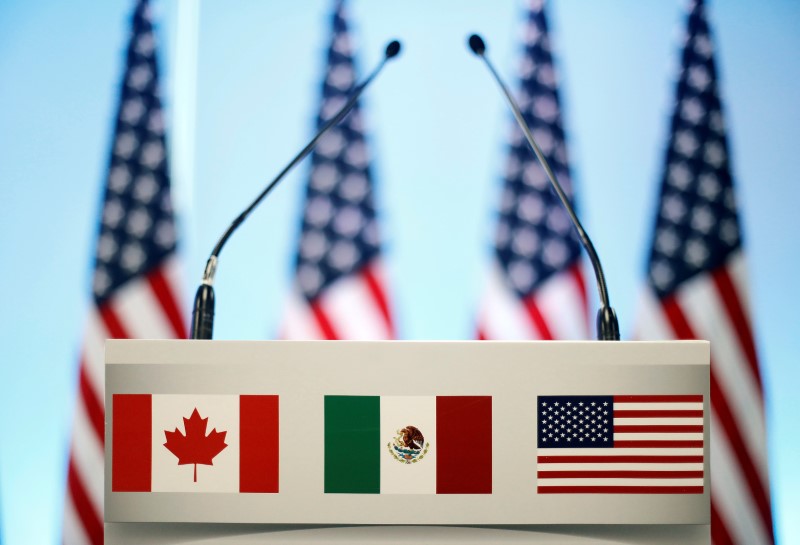 © Reuters. The flags of Canada, Mexico and the U.S. are seen on a lectern before a joint news conference on the closing of the seventh round of NAFTA talks in Mexico City
© Reuters. The flags of Canada, Mexico and the U.S. are seen on a lectern before a joint news conference on the closing of the seventh round of NAFTA talks in Mexico CityBy Bruno Federowski and Miguel Gutierrez
BRASILIA/MEXICO CITY (Reuters) – U.S. President Donald Trump’s threats to scrap the North American Free Trade Agreement (NAFTA) will soon be a distant memory, likely to be supplanted by only slight changes to the 24-year-old pact, a Reuters poll of economists suggested.
None of the 80 forecasters – most based in Canada, the United States and Mexico – polled by Reuters April 16-24 expect NAFTA to be terminated.
A large majority said the most likely outcome is a marginally different agreement, with only six expecting radical changes.
The results, though mostly in line with a January poll, showcase growing conviction among economists and analysts that months of thorny conversations will deliver a good outcome for all parties.
The findings come despite Trump’s decision to deliver on some of his campaign trail protectionist threats by hiking tariffs on steel and aluminum imports.
This suggests companies and policymakers may have convinced Trump to focus on China, instead of the pact underpinning over $1 trillion per year in trade between Mexico, the U.S. and Canada.
“The U.S. government has acknowledged the strong economic ties between the three North American economies, a result of efforts by pressure groups signaling to Trump’s administration the relevance of that treaty,” said Jesús López, an analyst at Banco BASE in Mexico City.
His remarks underline a recent swing toward optimism in official communications around NAFTA as negotiators stepped up efforts to reach an agreement ahead of Mexico’s July 1 presidential elections.
Trump said this week that a new NAFTA could be agreed on quickly as Canada hailed progress on forging new rules for the auto industry, the main standing point in talks to revamp the trade pact.
A preliminary agreement could be announced as soon as this month, respondents said.
“May 1 seems to be a key date to watch, not only because it signals the expiration of the exemption of Canada and Mexico from the steel and aluminum tariffs announced last month, but also because we would be six months apart from the U.S. midterm election,” JPMorgan (NYSE:) economist Gabriel Lozano, based in Mexico City, wrote in a report.
Auto rules of origin, as well an opt-in mechanism for conflict resolution, are likely to be the main area of change, said Barclays (LON:) analyst Marco Oviedo in New York. “The rest is likely to amount to marginal updates.”
A new NAFTA is likely to push the region’s automakers to source more parts from North America to create more jobs, but also raise costs for Detroit’s main car manufacturers.
Trump’s negotiators initially demanded North American-built vehicles contain 85 percent content made in NAFTA countries by value, up from 62.5 percent now. But industry officials say that has been cut to about 75 percent, with certain components coming from areas with higher wages.
Though a preliminary agreement would leave many details to be ironed out in coming months, it would ease uncertainty that has capped business investment in both Canada and Mexico.
“NAFTA will not be gone as a topic of conversation going forward, but even some kind of preliminary announcement is likely to be seen as a strong positive signal and have some effect on growth,” said Scotiabank deputy chief economist Brett House in Toronto.
The optimism around North American trade negotiations contrasts with escalating tensions between the U.S. and China that have stoked fears of a trade war between the world’s top two economies.
Trump’s administration proposed 25 percent tariffs on some 1,300 Chinese industrial, technology, transport and medical products, driving China to shoot back with a list of similar duties on major American imports including soybeans, planes, cars, beef and chemicals.
Source: Investing.com





























